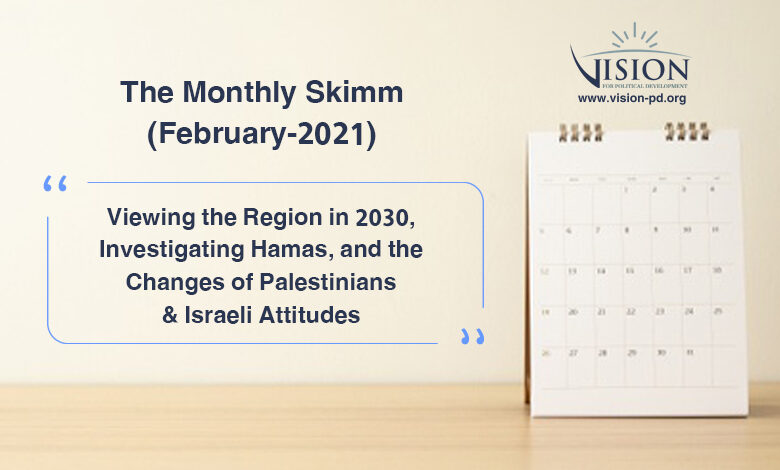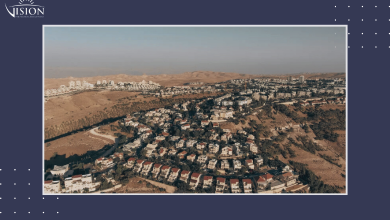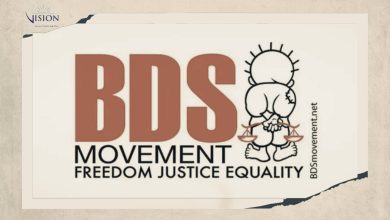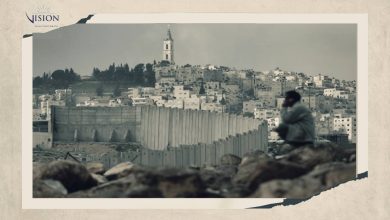The Monthly Skimm (February 2021): Viewing the Region in 2030, Investigating Hamas, and the Changes of Palestinians & Israeli Attitudes

*Mohammed Hasan: Researcher in Political Science
Will Hamas Be Investigated?
. One of the surprises beyond the partial reconciliation between Hamas and Fatah is the vulnerability of Hamas to war crime investigations by the Hague International Criminal Court as a corollary to Israeli war crime investigations which were prompted by Palestinian petition. The International Court decided to investigate Israeli crimes due to Palestinian demand so now Hamas will also be investigated. This can lead to more discord between Hamas and Fatah as Fatah will fear that its legitimacy will be undermined in case there was a coalition after the election in light of the continuity of the Hague court investigations of Hamas. Furthermore, Israel will work internationally to categorize Palestine as a terrorist state in light of the connections between Hamas and Fatah (Inbari, 2021).
What Drives the Election Procedure and Partial Reconciliation Between Hamas and Fatah (Kuperwasser, 2021)?
- .Abbas’s Fatah movement calculates that elections and the perception of Fatah and Hamas unity will diminish additional erosion to the Palestinian Authority’s status produced by normalization agreements between Israel and a few Arab countries.
- It is expected that the democratic election procedure along with superficial behavioral changes (e.g., changing the payment method for imprisoned terrorists) will give grounds for the new U.S. leadership’s desire to restore financial aid to the Palestinian Authority.
- The election process is intended to placate both the international order and the Palestinian electorate by fabricating the perception of Palestinian unity while maintaining Abba’s command of the territories.
- Hamas embraces the election process as it seeks maintain power in Gaza and to obtain recognitional legitimacy. There are elites in the current U.S. administration (e.g., Hadi Amr and Robert Malley) who have made the case for legimising Hamas.
How to view the Middle East in 2030 from the Israeli Perspective?
According to different scenarios, the strategic environment of Israel is to change dynamically (Heistein, 2021):
- The competition between great powers (china and the USA) will not be to the benefit of Israeli advancement of its national security in the region, where the region is able to divide into contradicting camps. Furthermore, the U.S. will prioritize international competition with China at the expense of its regional interests.
- The diplomatic relations between Israel and the Arab States is reversible.
- Changes in the Iranian regime do not guarantee that its nuclear or regional ambitions would be curbed.
- Any actor in the region could obtain nuclear arms suddenly.
- Deterioration of economy and order in the region would decrease the major military threats to Israel, and that would increase Israel’s footprint in the region.
- Environmental problems such as the climate change or water scarcity could lead to greater cooperation between the different actors in the region and Israel.
- Bipartisan political support of Israel is on the wane as Democrats are adopting a less pro-Israel position. This could inevitably lead to the departure of American support to Israel.
The Changes of Israeli-Palestinian Attitudes towards the Conflict
The political alternatives were not acceptable for both majorities of the Palestinians and the Israelis. For the majority of Israeli Jews, the most acceptable alternative is the continuity of status quo. For the majority of Palestinians in three regions; 1948 area, Gaza and West Bank, there is no acceptable alternative to solve the conflict. Still the majority of Palestinians support a two state solution, particularly the Palestinians in 1948 area and the West Bank (Egel, 2021).
However, there has been a development in the Palestinian orientation towards the two-state solution. For the Palestinians, they seek a state with an army to defend its border and a border where they can independently control its economy. While the Israelis show satisfaction with the status quo, the Palestinians highly dislike it. Interestingly, both Israelis and Palestinians tend to distrust their leadership (Egel, 2021).
The Offshore Gaza Marine Gas Field and the Israeli-Egyptian Discussions
Senior Egyptian official and energy minister Tarek al-Molla visit to Israel did not only include schematic cooperation about the undetermined route of a new pipe line, but the discussions included the offshore Gaza marine gas field and the intended power station in Jenin. Although Hamas is not seen as a qualified player in the development of gas field (Henderson, 2021) its acceptance would be required to actualize said work. These issues are not separate from the Israel’s preemptive steps to settle the complicated regional issue related to the distribution of gas in the Mideast.
Palestinian Refugees between Myth and Reality
Peace cannot be built on myths. There are religious and ideological motives that push American officials to increasingly adopt myths and fabrications about the Palestinian refugees. These fabrications and myths are as follows (Alhamdan, 2021):
- The Palestinians voluntarily left their lands in 1948; therefore, Israel bears no responsibility for the refugee issue
- 194 UN General Assembly Resolution is non-binding in the context of international law, so, the Palestinians have no right to return to their fatherland.
- The Palestinians pass their refugee status to descendants thereby is inflating the actual refugee numbers.
- UNRWA plays a role in the perpetuation of the Palestinian refugee status, and if the Palestinians were to fall under the UNHCR aegis, they would not be categorized refugees.
The US is not a Source of Stability in the Region
Have the US’s Middle East policies been sufficient in the reduction of conflict? No! The evidence comes from the Iranian experience, where policies aimed at creating maximum pressure were neither successful in destabilizing its regional activities, nor in curbing its nuclear program. Furthermore, the Shi’a militia groups are still active. One of the main reasons that the US has not contributed toward regional stability is due to its inability to reduce the drivers of conflict, such as promoting economic development. Economic development in Iraq, for instance, is a fundamental factor in reducing the danger of ISIS and terrorist Shi’a groups ( Kaye, Robinson, Martini, Vest, & Rhoades, 2021).
*Monthly Skimm is a narrative brief of the political opinions and analysis conducted by considerable think tanks about the Palestinian-Israel conflict.
References:
Kaye, D. D., Robinson, L., Martini, J., Vest, N., & Rhoades, A. (2021). Reimagining U.S. Strategy in the Middle East . Retrieved from Rand: https://www.rand.org/pubs/research_reports/RRA958-1.html
Alhamdan, N. (2021). Palestinian Refugees: Myth vs Reality. Retrieved from Middle East Institute: https://www.mei.edu/publications/palestinian-refugees-myth-vs-reality
Egel, D. (2021). Alternatives in the Israeli-Palestinian Conflict. Retrieved from RAND: https://www.rand.org/pubs/research_reports/RRA725-1.html
Heistein, A. (2021). What will the Middle East look like in 2030? An Israeli Perspective. Retrieved from Middle East Institute: https://www.mei.edu/publications/what-will-middle-east-look-2030-israeli-perspective#pt3
Henderson, S. (2021). Israel Secures Egyptian Gas Export Route . Retrieved from The Washington Institute: https://www.washingtoninstitute.org/policy-analysis/israel-secures-egyptian-gas-export-route
Inbari, P. (2021). Will a Hamas-Fatah Reconciliation Work? The Elephant in the Room . Retrieved from Jerusalem Center for Public Affairs: https://jcpa.org/will-a-hamas-fatah-reconciliation-work-the-elephant-in-the-room/
Kuperwasser, Y. (2021). What Drives the Palestinian Reconciliation and Election Processes? . Retrieved from Jerusalem Center for Public Affairs: https://jcpa.org/article/what-drives-the-palestinian-reconciliation-and-election-processes/
Shragai, N. (2021). The Strategic Construction Plans in Jerusalem: Will the Biden Administration Weigh In? . Retrieved from Jerusalem Center for Public Affairs : https://jcpa.org/the-strategic-construction-plans-in-jerusalem-will-the-biden-administration-weigh-in/





